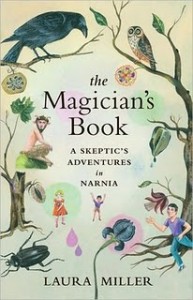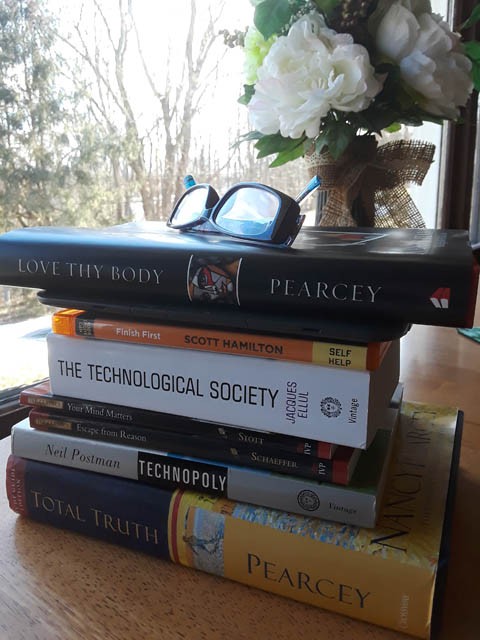The Magician’s Book
 Reading The Magician’s Book: A Skeptic’s Adventures in Narnia has been a rollercoaster experience. In that sense, the title is apt, named as it is after the weighty tome Lucy leafs through in search of a spell that will free the dufflepuds from invisibility in The Voyage of the Dawn Treader. The book attracts and repels Lucy by turns. This book had a similar effect on me.
Reading The Magician’s Book: A Skeptic’s Adventures in Narnia has been a rollercoaster experience. In that sense, the title is apt, named as it is after the weighty tome Lucy leafs through in search of a spell that will free the dufflepuds from invisibility in The Voyage of the Dawn Treader. The book attracts and repels Lucy by turns. This book had a similar effect on me.
As a child, Laura Miller was captivated by the Narnia books, reading them repeatedly and finding in them her own desires realized in a fictional place she longed to go to. As an adult skeptic not in sympathy with the Christian themes in the Chronicles, Miller returns to examine them with a critical eye. She concludes,
Everything that Lewis had ever read and loved went into Narnia, and because he was a great reader, these things were as deeply felt by him as actual experiences. In his own way, Lewis, too, believed that everything in the Chronicles was true, and this conviction is what he communicates to his young readers.
It was a fascinating voyage, once I passed the halfway point. In the first half, I struggled with wanting to throw the book across the room. I talked to the pages. I wrote long complaints in my reading journal.
The first half of the book focuses on what Miller sees as the failures of the Chronicles (chiefly their Christianity) and of Lewis personally. In some ways it reads as an extended dressing-down of Lewis for chauvinism, prejudice, hyper-conservatism, and general sneakiness for “proselytizing.” On questions of interpretation, I simply didn’t agree with some of her literary judgments. On questions of Lewis’s personal life, I know enough about the subject to recognize that some of the personal charges are exaggerated.
It’s not that I can’t handle the idea that Lewis had failings. Of course he did (along with most of the Patriarchs in the Bible). Miller seems to be under the impression that if Lewis’s Christian admirers knew more about him, they would become disillusioned. But his Christian admirers, if they are indeed Christian, should be the most clear-eyed and gracious of all on the subject of sin.
Mostly, I object to the school of thought that sees an author’s private life as territory relevant to literary criticism. Miller writes that after she entered college, poststructuralist and postmodern theory became popular:
Books that past generations regarded as eternal monuments of genius were dragged into the courts of theory and indicted for their ideological inadequacies. Their authors’ personal lives and political beliefs served as evidence against them. Racism, sexism, classism, and homophobia lurked everywhere, often in disguises that required expert decoding.
In some ways, I felt this was the kind of study Miller was conducting. Yet she continues,
The honest, educated reader, when tackling the towering literary works of the past, now faces a different, though no less precarious task: how to acknowledge an author’s darker side without losing the ability to enjoy and value the book.
We’re on the same page, I thought. I’ll stick with it, and see where she goes from here.
I’m so glad I did. Miller’s discussion in the second half of the book is urbane, wide-ranging, engagingly written. She writes without condescension about children’s reading experiences, and captures feelings many readers of the chronicles share. Among the topics she addresses are:
- Lewis’s ideas regarding myth and the friendships that shaped his thinking
- His friendship with Tolkien
- His views concerning Medieval worldview and literature
- Nature depictions in the Chronicles
- The Wood between the Worlds (one of my favorite parts of Narnia) as, among other things, a vast library
- Fairy tales in general
- The countrysides of England and Ireland and the history inscribed on the very landscape
Scholarly yet conversational, the voice that emerges from these pages inspires my respect and liking. When Miller lies down in an ancient barrow and tries to imagine the people who made it, or describes her initial reaction to Narnia, or ventures brilliantly down any number of scholarly pathways into different branches of literature or history, I feel nothing but keen interest and pleasure.
Since finishing The Magician’s Book, I’ve wondered whether the problem is that a belief system can’t be fully evaluated from a skeptical vantage point. Certain aspects can be, but there is something to be said for the eye of faith. The analogy that comes to mind is of attempting to write a critique of, say, Michelangelo’s David based on a black and white photograph. My observations would be accurate only to a point; the full experience of the sculpture would have to be more tactile. I’d have to see it in person to experience its size, its dimensionality, its color. That’s the only way to see its full meaning.
I hate the fact that what I say could be misinterpreted to mean that Christianity is an exclusive club. It is open to all. But Miller’s references to Christianity from her perspective as a lapsed Catholic are unrecognizable to me as a believer, and on some points she is demonstrably inaccurate in her understanding. Having gotten this button into the wrong hole, her conclusions about Lewis’s practice of it, and all that radiates from that center artistically and personally, fail to line up either.


